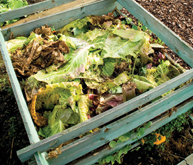Graduating class gives to Gorilla Composting
Graduating class gives to Gorilla Composting McGill University
User Tools (skip):
Graduating class gives to Gorilla Composting

One person's rotting foodstuff is another person's compost.
ISTOCKPHOTO
When Gorilla Composting first appeared in February 2005, their pilot project was to collect food waste in the Shatner Building. To say that the project was a success would be a gross understatement: not only does the group have Shatner's food waste under control, it collects food waste from 80 percent of the food providers on campus. The group has held workshops on composting and has even designated three public drop-off points where students can deposit their food scraps from home.
This year, the graduating class of 2006 is chipping in to support Gorilla Composting with the Class Action Gift – they hope to raise $15,000. A tradition since 1989, Class Action allows students to give back to the McGill community in a way both memorable and meaningful. Celina Starns, graduating MSE student and Gorilla Composting executive member, is excited about this year's gift, explaining that "this is the first year that Class Action is for a student group."
With the Class Action gift, the new Gorilla Composting goal is to make McGill the first Montreal institution to compost all of its organic matter. Other long-term visions include treating the compost on McGill's own Macdonald Campus (it is now donated to a local farm) so that McGill can save thousands by using its own homemade fertilizer instead of purchasing it from outside sources. "The idea of sustainability is in everyone's long-term interest" added Starns.
She stressed that supporting Gorilla Composting is a "tangible decision you can make to divert waste from landfills, to produce organic fertilizer and to reduce dependency on synthetic oil-based fertilizers."
For more information, visit www.gorilla.mcgill.ca.

